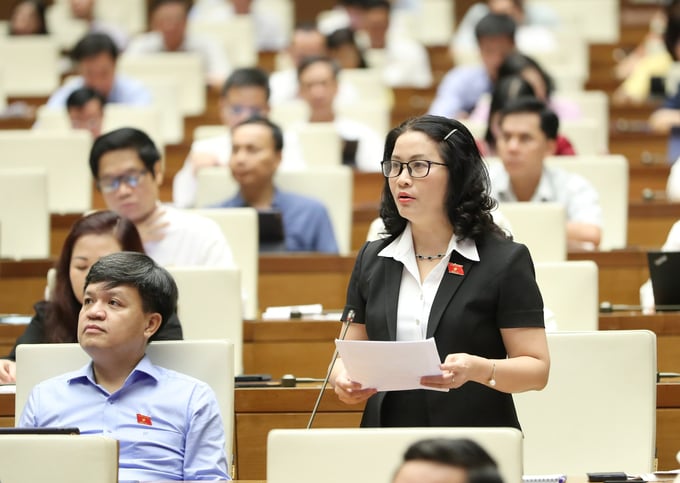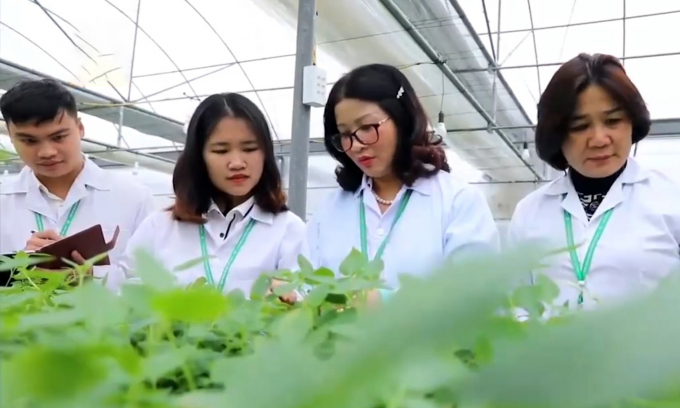May 31, 2025 | 14:16 GMT +7
May 31, 2025 | 14:16 GMT +7
Hotline: 0913.378.918
May 31, 2025 | 14:16 GMT +7
Hotline: 0913.378.918

Prof. Nguyen Thi Lan, Director of Vietnam National University of Agriculture (VNUA), speaking at the 5th session of the National Assembly term XV. Photo: QH.
Prof. Nguyen Thi Lan, Director of Vietnam National University of Agriculture (VNUA), said, “In any field or industry, the human factor still plays a decisive role. The quality of human resources determines the speed and quality of growth and has a great influence on the process of socio-economic development”.
This is also a factor affecting the use and protection of other resources. Considering the current context with the requirements of trade competition and international integration, the new standards posed by the industrial revolution 4.0, and especially the unpredictability of climate change, epidemics and conflicts, the agricultural sector is once again identified by the Party and Government as "the national advantage, the backbone of the economy", a factor that secures security, safety and social order.
It can be seen that the agricultural industry is currently in a period of rapid transition from traditional agriculture to agriculture 4.0, smart agriculture, knowledge agriculture based on the application of high technology in order to increase add-value and ensure sustainable development. The new age calls for new standards, so human resources training proves to be crucial.
Receiving great attention from the Party and State in recent times, the agricultural sector has trained a qualified and skilled labor force, making an important contribution to the development of the industry and the country.
However, many assessments also reveal that human resources, especially high-quality human resources in the agriculture and rural development sector, are numerous but not strong. The force is lacking in several aspects, especially in terms of experts, leaders, people who can master high technology and techniques, not to mention untrained rural laborers still occupies a large proportion.

Vietnam National University of Agriculture has its focuses on high-quality human resources. Photo: VNUA.
Regarding human resources training, information from the meeting between the Ministry of Education and Training and the Ministry of Agriculture and Rural Development on February 21, 2023 has shown that the labor force in the agricultural sector currently accounts for approximately 30% of the national labor force. The problem is that students applying to study agriculture in universities account for less than 2% of the total annual enrollment quantity.
In the period 2016 - 2020, students registered in the fields of agriculture, forestry, fisheries and water resources decreased by over 30% compared to the period 2011 - 2015. In recent years, some traditional agricultural industries have had few or even no students enrolled.
In order to have high-quality human resources to meet the requirements of reality, Prof. Nguyen Thi Lan proposed to the state, ministries, branches and training institutions six solutions:
Firstly, disseminate information to the media, deepen and concretize guidelines and policies of the Party and State to create unity in the whole society, from all levels, branches, localities to the grassroots level, from training institutions to high schools; raise awareness of the importance of agriculture to the country; provide full information on demands for human resources and areas that the country is in need of.
Secondly, develop policies to encourage students to study in social disciplines that are in high demand but difficult to enroll in such as Soil Science, Agronomy, Fisheries, Post-Harvest Technology, etc; place orders and assign tasks to highly qualified institutions to train human resource in important fields or industries that are difficult to recruit but are in high demand by society.
Thirdly, soon review the Ministry of Agriculture and Rural Development’s planning of training institutions in order to invest with great focus; upgrade training institutions to ensure training quality.
Fourthly, training institutions focus on reviewing training improvement solutions and existing training programs so that graduates possess good skills, thereby meeting the requirements of practical demands.
Fifthly, in addition to training high-quality human resources (experts, leaders, engineers, etc.), pay attention to the quality of short-term training; provide skill and knowledge training to the people; train leaders in communities, especially ethnic minorities and mountainous people through specific and effective models.
Sixly, well-perform the work of connecting training institutions - enterprises - society to come up with specific and practical solutions in line with the development requirements in the current context.
Translated by Samuel Pham

(VAN) Several scientists and farmers are experimenting with soil treatment in some key durian-growing regions such as Cai Lay (Tien Giang), Dak Song, Gia Nghia, and Dak R’lap (Dak Nong).
/2025/05/25/4127-3-073637_820.jpg)
(VAN) Thanks to the promotion from an FAO-implemented project, vegetable production in greenhouses in Moc Chau has seen strong development, from 1.5 hectares in 2021 to nearly 50 hectares in 2024.

(VAN) FAO has recently supported USD 140,000 to implement the project 'Risk mitigation human-animal interface risks through disease control initiatives in pig farming.'

(VAN) The People's Committee of Tra Vinh province has approved an adjustment to the investment policy for the Green Hydrogen Plant project, increasing its area to approximately 52.76 hectares.
![Reducing emissions from rice fields: [2] Farmers’ commitment to the soil](https://t.ex-cdn.com/nongnghiepmoitruong.vn/608w/files/news/2025/05/05/dsc08881jpg-nongnghiep-140632.jpg)
(VAN) Clean rice cultivation model in Thuong Tan commune, Bac Tan Uyen district, is assisting local residents in achieving sustainable agriculture by substantially reducing costs, increasing productivity, and protecting the environment.

(VAN) At the conference to disseminate Resolution No. 68, AgriS introduced its digital agricultural ecosystem and reaffirmed its commitment to accompanying the Government in promoting private sector development and sustainable agriculture.

(VAN) 'Blue Ocean - Blue Foods' initiative is designed to restore marine ecosystems and establish sustainable livelihoods for local communities by cultivating a minimum of 1,000 hectares of cottonii seaweed in the first three years.